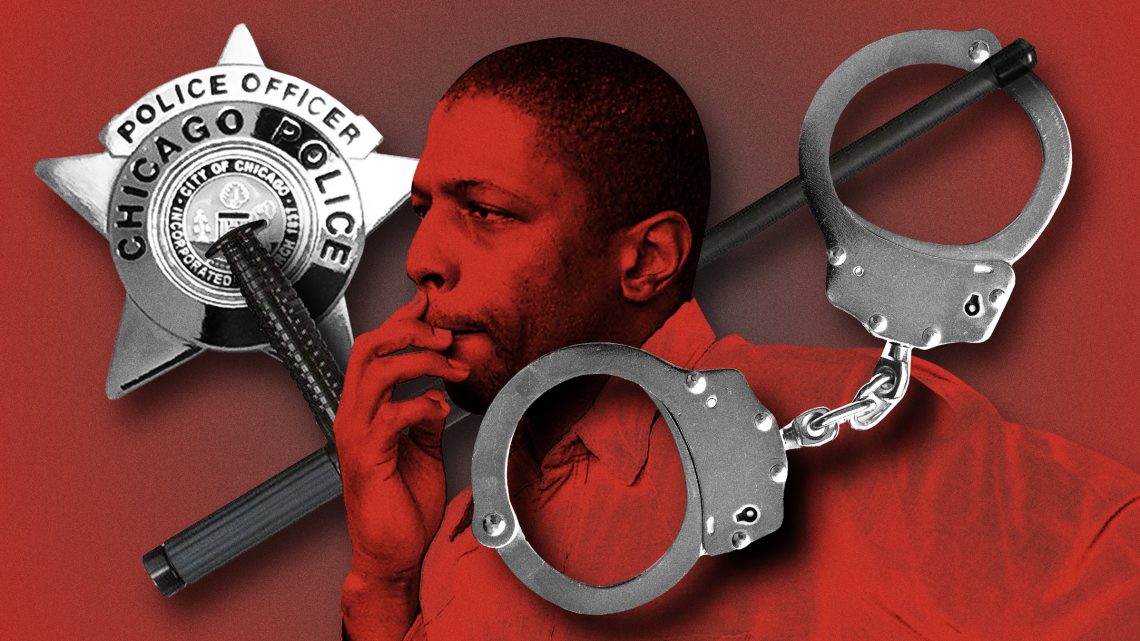
I Was Tortured into Giving a False Confession to Chicago Police
July 17, 2018"Dazed and numb," Ronald Kitchen recalls, "I descended the stairs leading from Area 3 Violent Crimes—the hellhole where I had been tortured and kept prisoner during the previous 24 hours.... That first night, in the lockup across town, my body finally started coming alive. The pain hit, the swelling began, bruises appeared. For hours I lay alone, moaning, screaming, and crying for help. And no one responded."
Arrested at the dawn of adulthood, Kitchen was accused of a horrible crime: the murder of two women and three children on the southwest side of Chicago. It was August 1988, and a police informant named Willie Williams claimed Kitchen had confessed to him over the phone and even indicated the murders were sparked by an old drug debt. There was no corroborating evidence to prove Williams's claim, and no physical evidence linking Kitchen to the murders. Still, Chicago Police detectives arrested and interrogated Kitchen until he agreed to sign what we now know to be a false confession.
These weren't just any cops, either. The detectives were working for Chicago Police Commander Jon Burge, who was fired in 1993 after being accused of overseeing the systematic torture of African-American suspects with his so-called "Midnight Crew." Kitchen would go on to spend over 21 years in prison—about as long as he'd been alive—13 of them on death row, before finally being exonerated.
During interrogation, Kitchen says, officers handcuffed him to the wall and beat him repeatedly with a nightstick, a telephone, a telephone book, and their own fists. The brutality was so severe that, at his first court appearance after being charged, the judge ordered Kitchen's transfer to a hospital, where he was treated for a wide range of serious injuries. He visited the hospital every day for the next month and a half for follow-ups. “Bleak and painful as it was,” Kitchen remembers, it "offered the only relief from life in solitary confinement."
In their forthcoming book My Midnight Years: Surviving Jon Burge’s Police Torture Ring and Death Row, Kitchen and co-authors Thai Jones and Logan M. McBride tell his harrowing, nightmarish story in full. During his imprisonment, he read widely in pursuit of legal relief and, in the mid 1990s, helped found the Death Row 10, raising awareness of the inhuman and racist realities of capital punishment. After bearing witness to the catastrophe of wrongfully-convicted people facing execution, Illinois Governor George Ryan placed a moratorium on the death penalty in Illinois in 1999; in 2003, he commuted over 160 death sentences. Lawyers from Northwestern University’s Bluhm Legal Clinic, meanwhile, continued to work to prove Kitchen’s innocence, succeeding in winning his release in 2009. Four years later, he won a $6.15 million settlement with the city of Chicago.
Ronald Kitchen's story might seem like it comes from another universe, and certainly it represents a uniquely horrific experience with the law. But given the Trump Administration's approach to "law and order" and the ongoing plague of police violence in the country—including the recorded killing of Harith Augustus by Chicago cops this weekend—it's a timeless one. Kitchen's is the kind of survival story few can imagine, and that even fewer—if still too many—have come to know personally.
VICE: What’s your earliest memory of mistreatment by the police?
Ronald Kitchen: I guess you could say I was naive about a lot of things because I was being shielded from a lot of things. I never knew about cops setting people up until it happened to me. So, I never had a bad experience until August of 1988. That’s when I had my first really nasty encounter with the police, when I was being told I was being picked up for an auto theft and the auto theft turned into five murders.
Can you describe your treatment by Burge’s officers, including Detective Michael Kill, after you were apprehended in 1988?
The only time he'd seen me was when he was beating the crap out of me, making me confess to something I didn’t do. When I think about Officer Kill, it chokes me up at the same time it makes me mad. When I came home, my mother had dementia, so she didn’t know who I was. When you force someone to admit something they didn’t do, knowing that you’re going to seek the death penalty, knowing that death can come from this, it’s like the person going outside and committing murder themselves.
How familiar were you with the way the criminal justice system worked before you got caught up in this nightmare, and what did you glean from the inside?
The system was one-sided. Because once they put it in their mind, their job is not to determine who’s innocent; their job is to prosecute who's guilty. That lets you know that the system is way beyond repair. They’re always promoting those who are doing wrong. But those standing against the system, you find fault, you fire them, you move to them to the side.
You write in My Midnight Years that you spent most of your time on death row learning the law and reading. You mention that you were influenced in particular by the “Myth of the Cave,” an allegory in Plato’s Republic about leaving the metaphorical shadows inside a cave for the light outside. Can you describe how it shaped your perspective?
Socrates, Nietzsche—I read all of that. But when I came across the myth of the cave, that was where I was: I’m in that cell and all I see is what’s in front of me, which is a wall, and I got guys on the left side and the right side, and that’s all you hear.
A lot of guys left from the penitentiary but came back—couldn’t handle the free world. When I read Plato’s Myth of the Cave, that brought me to the understanding that a lot of people want their freedom, but once they get that freedom, they can’t handle it, so they gotta come back to what they know. When I read that, I said to myself, “I would never ever go back to that which I know.” And that kept me focused on really what was at hand.
Can you describe how the Death Row 10 was formed and what your role in it was?
We used to have law classes and study each others' cases and hold mock trials. And this brother named Stanley Howard was one of the co-founders—he came up with the idea. He put it together, and we worked from there. So from that, we pitched it to my mother and Stanley’s mother. We pitched this to them and they connected with CEDP (Campaign to End the Death Penalty). So, when CEDP got a hold of it, they’re the ones that put faces to our names, put our issues out there, and that’s how really we got strong. We had “Live from Death Row” events, call-ins [in coordination with CEDP]. So when the Death Row 10 got really hot, that’s where [former] Governor [George] Ryan switched gears.
Trust seems like a difficult thing to forge while behind bars. How did you make that happen with fellow inmates?
You can’t communicate with everybody when you’re in the penitentiary. So I think we had to let our guard down. We had to. When we had the same issues, the same police officers in our cases—that’s already a bond right there. I had to trust if I wanted to get the help or some type of healing that I needed. And by me doing that, I think that was probably the most powerful thing ever.
How pessimistic are you about meaningful police reform, given pro-police brutality comments by Donald Trump and a clear aversion to police accountability on part of Attorney General Jeff Sessions?
As long as we have the same police officers promoted to higher positions in the police department, you’re never going to see a reform. I don’t care how many video cams we see. Because video cams show that police are still doing the same thing. We see them shoot people in the back. We see them walk up to cars when people have their hands in their air, they still shoot them. There’s no such thing as police reform. Now, when they know they’re on camera, you hear them saying, "Sstop resisting!" even when people have their hands in the air. All cops aren’t bad cops, but if they’re not telling on those who are doing bad....
Until we recognize where the problem lies, police reform is just words on a piece of paper.
When others invoke your name in the struggle against the racism and brutality widespread in policing and the criminal justice system, what do you want your name to mean to them?
Survivor. I have seen the pits of hell. I’ve been there. I have seen men get walked to their deaths, executed. I have known these guys. I have seen, I was there. When people read about me, I want them to have the words come out of their mouth: “Survivor.” “Strong black man.” “He fought the system.”
Some might say I won. Do I feel like I’m a winner? No, because I lost my grandmother, I lost my brother, my nephew, and my mother in the 21-and-a-half years I was gone. So when you talk about Ronald Kitchen, I want people to talk about the strength I show when I speak to people, when I walk down the street—how I carry myself. They didn’t break me. They just made me aware and gave me the strength to put up a fight against them.
Learn more about Kitchen's book, out August 1, here.
Sign up for our newsletter to get the best of VICE delivered to your inbox daily.


